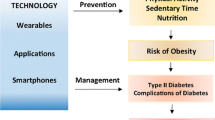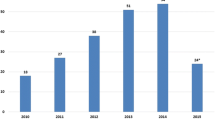Abstract
Purpose of Review
The objective of this review was to summarize the current scientific evidence of mobile health technology in the primary prevention of type 2 diabetes in patients with prediabetes derived from randomized clinical trials.
Recent Findings
Few randomized clinical trials are available using mobile health technologies in the prevention of type 2 diabetes. There is heterogeneity in regard to the main study outcomes, duration of interventions, and study findings.
Summary
Inconsistent findings have been reported whether mobile health technologies are effective in reducing HbA1C levels or the incidence of type 2 diabetes in patients with prediabetes. However, results are promising that mobile health interventions may decrease body weight. Future study may consistently measure changes in glycemic indicators as well as develop elements that better address behavior changes.


Similar content being viewed by others
References
International Diabetes Federation. IDF diabetes atlas. 9th ed. Brussels: International Diabetes Federation; 2019.
WHO. Global status report on noncommunicable diseases 2014. Geneva: World Health Organization; 2014.
WHO. Global health estimates: deaths by cause, age, sex and country, 2000±2012. Geneva: World Health Organization; 2014.
Pan XR, Li GW, Hu YH, Wand JX, Yang WY, An ZX, et al. Effects of diet and exercise in preventing NIDDM in people with impaired glucose tolerance. The Da Qing IGT and Diabetes Study. Diabetes Care. 1997;20:537–44.
Ramachandran A, Snehalatha C, Mary S, Mukesh B, Bhaskar AD, Vijay V, et al. The Indian diabetes prevention programme shows that lifestyle modification and metformin prevent type 2 diabetes in Asian Indian subjects with impaired glucose tolerance (IDPP-1). Diabetologia. 2006;4:289–97.
Turner RC, Cull CA, Frighi V, Holman RR. Glycemic control with diet, sulfonylurea, metformin, or insulin in patients with type 2 diabetes mellitus. Progressive requirement for multiple therapies (UKPDS 49). JAMA. 1999;281:2005–12.
Tuomilehto J, Lindström J, Eriksson J, Valle TT, Hämäläinen H, Ilanne-Parikka P, et al. Prevention of type 2 diabetes mellitus by changes in lifestyle among subjects with impaired glucose tolerance. N Engl J Med. 2001;344:1343–50.
Knowler WC, Barrett-Connor E, Fowler SE. Reduction in the incidence of type 2 diabetes with lifestyle intervention or metformin. N Engl JMed. 2002;346:393–403.
Kosaka K, Noda M, Kuzuya T. Prevention of type 2 diabetes by lifestyle intervention: a Japanese trial in IGTmales. Diabetes Res Clin Pract. 2005;67:152–62.
Roumen C, Corpeleijn E, Feskens EJ, Mensink M, Saris WHM, Blaak EE. Impact of 3-year lifestyle intervention on postprandial glucose metabolism: the SLIM study. Diabetes Med. 2008;25(5):597–605.
Ackermann RT, Finch EA, Caffrey HM, Lipscomb ER, Hays LM, Saha C. Long-term effects of a community-based lifestyle intervention to prevent type 2 diabetes: the DEPLOY extension pilot study. Chronic Illn. 2011;7(4):279–90.
Ackermann RT, Finch EA, Brizendine E, Zhou H, Marrero DG. Translating the Diabetes Prevention Program into the community. The DEPLOY Pilot Study. Am J Prev Med. 2008;35(4):357–63.
Ali K, Echouffo-Tcheugui J, Williamson DF. How effective were lifestyle interventions in real-world settings that were modeled on the Diabetes Prevention Program? Health Aff (Millwood). 2012;31(1):67–75.
Costa B, Barrio F, Cabré JJ, Pinol JL, Cos X, Sole C, DE-PLAN-CAT Research Group, et al. Delaying progression to type 2 diabetes among high-risk Spanish individuals is feasible in real-life primary healthcare settings using intensive lifestyle intervention. Diabetologia. 2012;55(5):1319–28.
Gilis-Januszewska A, Lindström J, Tuomilehto J, Piwonska-Solska B, Topor-Madry R, Szybinski Z, et al. Sustained diabetes risk reduction after real life and primary health care setting implementation of the diabetes in Europe prevention using lifestyle, physical activity and nutritional intervention (DE-PLAN) project. BMC Public Health. 2017;17(1):198.
Laatikainen T, Dunbar JA, Chapman A, Kilkkinen A, Vartiainen E, Heistaro S, et al. Prevention of type 2 diabetes by lifestyle intervention in an Australian primary health care setting: Greater Green Triangle (GGT) Diabetes Prevention Project. BMC Public Health. 2007;7:249.
Nilsen V, Bakke PS, Gallefoss F. Effects of lifestyle intervention in persons at risk for type 2 diabetes mellitus - results from a randomised, controlled trial. BMC Public Health. 2011;11:893.
Penn L, White M, Oldroyd J, Walker M, Alberti KG, Mathers JC. Prevention of type 2 diabetes in adults with impaired glucose tolerance: the European Diabetes Prevention RCT in Newcastle upon Tyne, UK. BMC Public Health. 2009;9:277–83.
Saaristo T, Moilanen L, Korpi-Hyövälti E, Vanhala M, Salteva J, Niskanen L, et al. Lifestyle intervention for prevention of type 2 diabetes in primary health care: one-year follow-up of the Finnish National Diabetes Prevention Program (FIN-D2D). Diabetes Care. 2010;33(10):2146–51.
Holtz B, Lauckner C. Diabetes management via mobile phones: a systematic review. Telemed J E Health. 2012;18:175–84.
Krishna S, Boren SA. Diabetes self-management care via cell phone: a systematic review. J Diabetes Sci Technol. 2008;2:509–17.
Russell-Minda E, Jutai J, Speechley M, Bradley K, Chudyk A, Petrella R. Health technologies for monitoring and managing diabetes: a systematic review. J Diabetes Sci Technol. 2009;3:1460–71.
Saffari M, Ghanizadeh G, Koenig HG. Health education via mobile text messaging for glycemic control in adults with type 2 diabetes: a systematic review and meta-analysis. Prim Care Diabetes. 2014;8(4):275–85.
Tao D, Or CK. Effects of self-management health information technology on glycaemic control for patients with diabetes: a meta-analysis of randomized controlled trials. J Telemed Telecare. 2013;19(3):133–43.
Fortmann AL, Gallo LC, Garcia MI, Taleb M, Euyoque JA, Clark T, et al. Dulce Digital: An mhealth sms-based intervention improves glycemic control in Hispanics with type 2 diabetes. Diabetes Care. 2017. https://doi.org/10.2337/dc17-0230.
Napolitano MA, Hayes S, Russo G, Muresu D, Giordano A, Foster GD. Using avatars to model weight loss behaviors: participant attitudes and technology development. J Diabetes Sci Technol. 2013;7(4):1057–65.
Williams JP, Schroeder D. Popular glucose tracking apps and use of mHealth by Latinos with diabetes: review. JMIR Mhealth Uhealth. 2015;3(3):e84.
Huffman M. Health coaching: a new and exciting technique to enhance patient self-management and improve outcomes. Home Healthc Nurse. 2007;25(4):271–4.
Bidargaddi N, Schrade G, Klasnja P, Licinio J, Murphy S. Designing m-Health interventions for precision mental health support. Transl Psychiatry. 2020;10:222. https://doi.org/10.1038/s41398-020-00895-2.
Page MJ, McKenzie JE, Bossuyt PM, Boutron I, Hoffmann TC, Mulrow CD, et al. The PRISMA 2020 statement: an updated guideline for reporting systematic reviews. BMJ. 2021;372:n71. https://doi.org/10.1136/bmj.n71.
Sterne JAC, Savovic J, Page MJ, Elbers RG, Blencowe NS, Boutron I, et al. RoB 2: a revised tool for assessing risk of bias in randomized trials. BMJ. 2019;366:14898. https://doi.org/10.1136/bmj.14898.
Block G, Azar KM, Romanelli RJ, Block TJ, Hopkins D, Carpenter HA, et al. Diabetes prevention and weight loss with a fully automated behavioral intervention by email, web, and mobile phone: a randomized controlled trial among persons with prediabetes. J Med Internet Res. 2015;17(10):e240. https://doi.org/10.2196/jmir.4897.
Fischer HH, Fischer IP, Pereira RI, Furniss AL, Rozwadowski JM, Susan L, et al. Text Message support for weight loss in patients with prediabetes: a randomized clinical trial. Diabetes Care. 2016;39(8):1364–70. https://doi.org/10.2337/dc15-2137.
Griauzde D, Kullgren JT, Liestenfeltz B, Ansari T, Johnson EH, Fedewa A, et al. Mobile phone-based program to promote healthy behaviors among adults with prediabetes who declined participation in free diabetes prevention programs: mixed-methods pilot randomized controlled trial. JMIR Mhealth Uhealth. 2019;7(1):e11267. https://doi.org/10.2196/11267.
Nanditha A, Thomson H, Susairaj P, Srivanichakorn W, Oliver N, Godsland IF, et al. A pragmatic and scalable strategy using mobile technology to promote sustained lifestyle changes to prevent type 2 diabetes in India and the UK: a randomised controlled trial. Diabetologia. 2020;63:486–96. https://doi.org/10.1007/s00125-019-05061-y.
Ramachandran A, Snehalatha C, Ram J, Selvam S, Simon M, Nanditha A, et al. Effectiveness of mobile phone messaging in prevention of type 2 diabetes by lifestyle modification in men in India: a prospective, parallel-group, randomised controlled trial. Lancet Diabetes Endocrinol. 2013;1(3):191–8. https://doi.org/10.1016/S2213-8587(13)70067-6.
Toro-Ramos T, Michaelides A, Anton M, Karim Z, Kang-Oh L, Argyrou C, et al. Mobile delivery of the Diabetes Prevention Program in people with prediabetes: randomized controlled trial. JMIR Mhealth Uhealth. 2020;8(7):e17842. https://doi.org/10.2196/17842.
Wong CK, Fung CS, Siu SC, Lo YY, Wong KW, Fong DY, et al. A short message service (SMS) intervention to prevent diabetes in Chinese professional drivers with pre-diabetes: a pilot single-blinded randomized controlled trial. Diabetes Res Clin Pract. 2013;102(3):158–66. https://doi.org/10.1016/j.diabres.2013.10.002.
The world ban. Mobile cellular subscriptions. https://data.worldbank.org/indicator/IT.CEL.SETS. Accessed November 15, 2021.
de Jongh T, Gurol-Urganci I, Vodopivec-Jamsek V, Car J, Atun R. Mobile phone messaging for facilitating self-management of long-term illnesses. Cochrane Database Syst Rev. 2012;12:2012.
Cole-Lewis H, Kershaw T. Text messaging as a tool for behavior change in disease prevention and management. Epidemiol Rev. 2010;32:56–69.
Acknowledgements
The SANENT group consists of following researchers:
MARIA, L., ARELLANO FLORES; Mexico
MERCEDES, E., LEDESMA MUÑOZ; Mexico
DIANA, A., GONZÁLEZ SOTELO; Mexico
OSCAR, M., DAVILA MALDONADO; Mexico
JHOANA, G., GOMEZ GARCIA; Mexico
FRANCISCO, J., LAUREANO HERNANDEZ; Mexico
JULIO EDUARDO ZARAZUA JIMENEZ; Mexico
BRENDA, A., PULIDO GARCIA; Mexico
HECTOR, RODRIGUEZ VAZQUEZ; Mexico
ALEXIS, A., RAMIREZ DORANTES; Mexico
LILIANA, A., GONZALEZ FIERRO; Mexico
JUAN, C., HERNANDEZ HERNANDEZ; Mexico
JORGE, ZENIL PEREZ; Mexico
Funding
This study was funded by Eli Lilly and Company.
Author information
Authors and Affiliations
Consortia
Corresponding author
Ethics declarations
Conflict of Interest
The authors declare no competing interests.
Additional information
Publisher's Note
Springer Nature remains neutral with regard to jurisdictional claims in published maps and institutional affiliations.
Noël C Barengo and Paula A Diaz Valencia are the co-first authors.
This article is part of the Topical Collection on Diabetes Epidemiology
Rights and permissions
About this article
Cite this article
Barengo, N.C., Diaz Valencia, P.A., Apolina, L.M. et al. Mobile Health Technology in the Primary Prevention of Type 2 Diabetes: a Systematic Review. Curr Diab Rep 22, 1–10 (2022). https://doi.org/10.1007/s11892-021-01445-w
Accepted:
Published:
Issue Date:
DOI: https://doi.org/10.1007/s11892-021-01445-w




